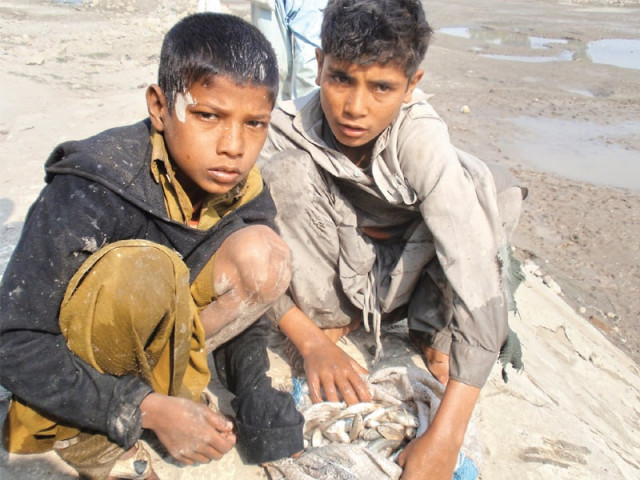As Rice canal’s ecology is disturbed, the silver lining is literally the fish to eat
There were reports that some fishermen had added harmful chemicals to the water.

Children rushed to the banks of the canal to dump fistfuls of small fish into bags. Some of them said they would sell their catch while others said they would eat them at home. PHOTO: EXPRESS
Last Thursday morning, gleeful children rushed to the muddy banks of the canal and began dumping fistfuls of small fish into polythene bags. Some of them said they would sell their catch while others said that they would take them home to eat.
The Sukkur Barrage is closed from January 6 to January 20 each year and during this time, its canals are patched with shallow ponds where a large number of fish become trapped. There were reports that some men had added poisonous chemicals to the water so that they could catch a large number of fish in one go. One of the residents said, “It has become a common practice for some greedy fishermen to add poisonous chemicals to the water to catch fish. They use little children to add the chemicals so that nobody would suspect them.” He added that two hours after the chemical was dumped into the water on Wednesday night, dead fish began to surface. The fishermen then filled polythene bags with the bigger fish, leaving heaps of smaller ones behind. “They are playing with the lives of people over petty profits.”

While talking to The Express Tribune, Zaheer Mirani, a man who sells fish in the market, said, “Some greedy fishermen add chemicals to the water for a bigger catch. This is not only harmful for marine life, but for people as well.”
Fish thus caught are first sorted according to their size and then the big ones are sold in the market, while smaller ones are sold as poultry-feed. Mirani added that the poisoned fish are also sold by the roadside at cheap rates and unsuspecting people happily purchase them.
When contacted, the wildlife department’s deputy director for Sukkur, Ghulam Muhammad Gadani, assured The Express Tribune that no poison had been added to the water. “The water level has gone down considerably and the quantity of sewage has increased, which is why this may have happened,” he said. “We have taken samples and the test results revealed that no chemical was present.”
When contacted, Imran Malik, a coordinator of the World Wildlife Fund, said, “As soon as we received reports of the death of a large number of fish, we visited the site and took samples. No chemical was found in the water.” He added that a huge quantity of sewage had killed the fish. “They died because of a deficiency of oxygen in the water.”
Published in The Express Tribune, January 14th, 2013.



















COMMENTS
Comments are moderated and generally will be posted if they are on-topic and not abusive.
For more information, please see our Comments FAQ